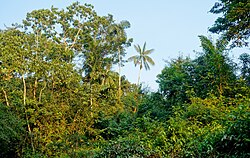| This article needs additional citations for verification. Please help improve this article by adding citations to reliable sources. Unsourced material may be challenged and removed. Find sources: "Sucumbíos Province" – news · newspapers · books · scholar · JSTOR (May 2011) (Learn how and when to remove this message) |
| Sucumbios | |
|---|---|
| Province | |
| Province of Sucumbios | |
 Cuyabeno Wildlife Reserve Cuyabeno Wildlife Reserve | |
 Flag Flag Seal Seal | |
 Location of Sucumbíos Province in Ecuador. Location of Sucumbíos Province in Ecuador. | |
 Cantons of Sucumbíos Province Cantons of Sucumbíos Province | |
| Country | Ecuador |
| Established | February 13, 1989. |
| Capital | Nueva Loja |
| Cantons | List of Cantons |
| Government | |
| • Type | Provincial |
| Area | |
| • Total | 18,000 km (7,000 sq mi) |
| Population | |
| • Total | 199,014 |
| • Density | 11/km (29/sq mi) |
| Time zone | UTC-5 (ECT) |
| Vehicle registration | K |
| HDI (2017) | 0.716 high · 18th |
| Website | www |
Sucumbíos (Spanish pronunciation: [sukumˈbi.os]) is a province in northeast Ecuador. The capital and largest city is Nueva Loja (normally referred to as Lago Agrio). It is the fifth largest province in the country, with an area of 18,084 km. In 2010, it had a population of 176,472 inhabitants.
Geography
Sucumbíos is bounded on the north by Colombia, on the south by Napo and Orellana, on the west by Carchi and Imbabura, on the southwest by Pichincha, and on the east by Peru. Sucumbíos is the only province in Ecuador that borders two different countries.
The province is one of the six provinces in the Amazon Region, a natural region of Ecuador.
Orography
The western area of the province belongs to the Eastern Andes Mountains, where most rivers in the province have their sources. The most important elevation in the province is the Reventador, an active volcano. The eastern portion of the province is part of the Amazon Basin, with high temperatures.
Hydrography
The main river in the province is the Aguarico River. It passes close to Nueva Loja, and empties into the Napo, on the Peruvian border. Other important rivers are the Putumayo, which marks the border with Colombia, and the Coca and Napo Rivers, in the south.
History
Sucumbíos was an unexplored area, where only indigenous people lived, until oil was discovered in its soil. In 1979, after nine years of foundation, Nueva Loja became the seat of its own canton, Lago Agrio Canton, in the Napo Province. On February 13, 1989, Sucumbíos became the 21st province in the country when it separated from Napo province.
Economy
The most important natural resource in the province is oil, the Lago Agrio oil field. Thus, Sucumbíos is one of the most important provinces in the country, economically.
Demographics
Ethnic groups as of the Ecuadorian census of 2010:
- Mestizo 75.0%
- Indigenous 13.4%
- Afro-Ecuadorian 5.9%
- White 4.5%
- Montubio 1.0%
- Other 0.2%
Political division
The province is divided into seven cantons. The following table lists each with its population at the 2001 census, its area in square kilometres (km), and the name of the canton seat or capital.
| Canton | Pop. (2019) | Area (km) | Seat/Capital |
|---|---|---|---|
| Cascales | 15,390 | 1,248 | El Dorado de Cascales |
| Cuyabeno | 7,200 | 3,875 | Tarapoa |
| Gonzalo Pizarro | 9,910 | 2,223 | Lumbaqui |
| Lago Agrio | 117,050 | 3,139 | Nueva Loja (Lago Agrio) |
| Putumayo | 15,450 | 3,559 | Puerto Carmen |
| Shushufindi | 56,700 | 2,463 | Shushufindi |
| Sucumbíos | 3,790 | 1,502 | La Bonita |
Places of interest
See also
References
- Citypopulation.de
- Villalba, Juan. "Human Development Index in Ecuador". Scribd (in Spanish). Retrieved 2019-02-05.
- "Resultados" (PDF).
- Cantons of Ecuador. Statoids.com. Retrieved 4 November 2009.
| Province | |
|---|---|
| Former Provinces | |
0°05′S 76°53′W / 0.083°S 76.883°W / -0.083; -76.883
Categories: